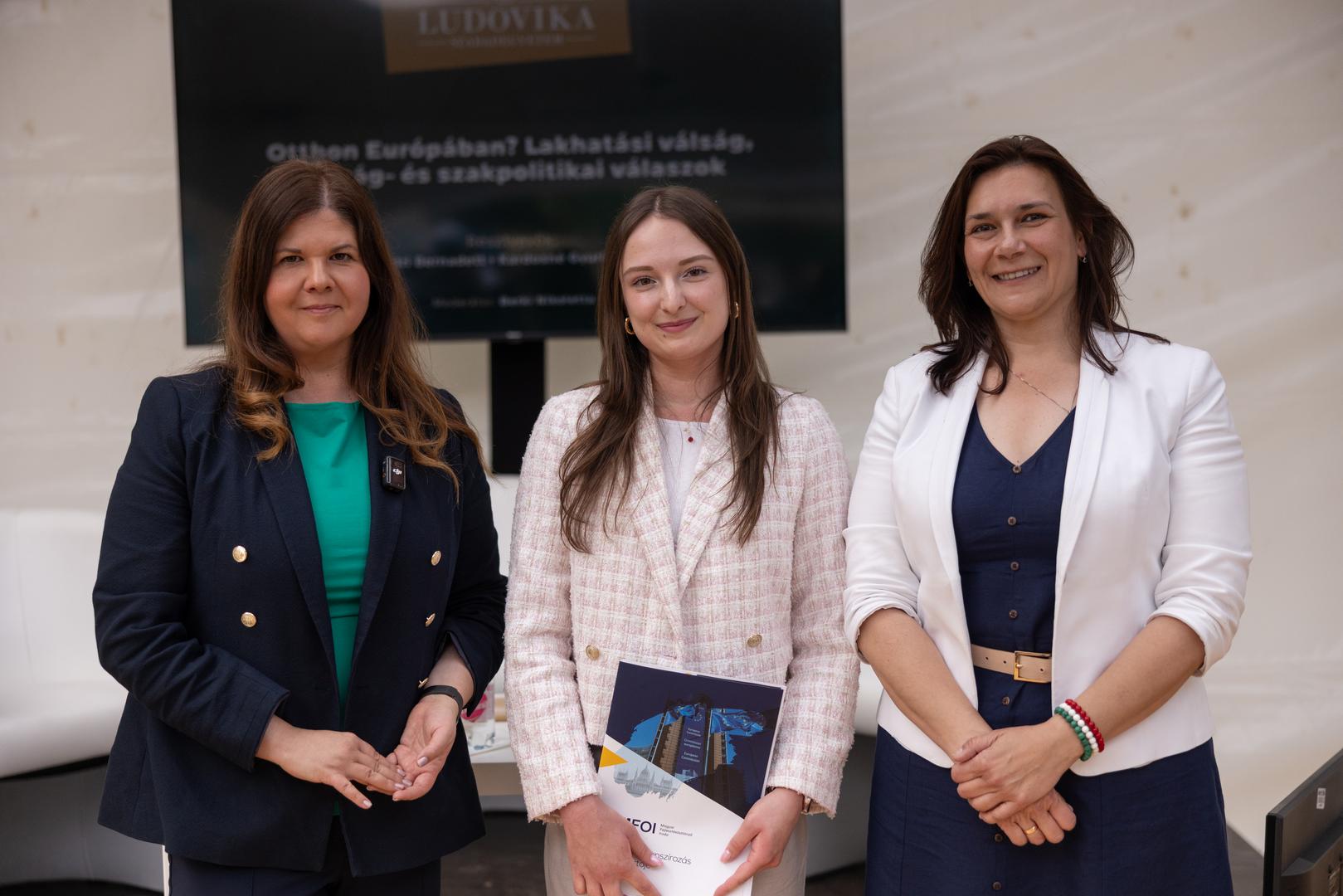
On May 9, 2025, the Ludovika Festival hosted a panel discussion titled “Home in Europe? Housing Crisis, Youth, and Policy Responses”, organized in cooperation between the Hungarian Development Promotion Office and the Europe Strategy Research Institute of the Eötvös József Research Center at the University of Public Service (NKE). The conversation took place between Dr. Bernadett Petri, Ministerial Commissioner responsible for the utilization of directly managed EU funds and head of the Europe Strategy Research Institute, and Katalin Kardosné Gyurkó, Ministerial Commissioner for Promoting Intergenerational Cooperation. The discussion was moderated by Nikoletta Berki, junior staff member at the Hungarian Development Promotion Office.

During the discussion, it was emphasized that a housing crisis is considered to exist when housing costs exceed 40% of household income—a threshold that Hungary meets. Over the past eight years, housing costs in Hungary have increased by 127%, while in Scandinavian countries the increase has been only around 5-6%. However, this disparity is partly due to already high base prices in those countries, whereas Hungary had a much lower starting point. Therefore, urgent EU-level action is needed. Although a European Commissioner and a dedicated committee already exist for this issue, Dr. Petri emphasized that a key element is still missing: the European Union should seek input from those who are most affected and have the deepest insight into the issue—namely, young people. One proposed solution is Erasmus+ Key Action 2, which allows youth organizations to develop projects that provide legal information to young people and facilitate cross-border information exchange. She also noted that this issue could be tied to education, with institutions supporting the transition after studies through Erasmus-style scholarships. Another potential initiative could focus on creating communal spaces and encouraging intergenerational housing, facilitating the exchange of experiences between young and older people.
Dr. Petri also spoke about the Self-Identity Act, stating that it was necessary because the outward migration from large cities has already transformed market dynamics in surrounding suburban areas. Prices have risen, and the standard of living of locals has been impacted. Based on measures to protect local communities, the restriction of Airbnb was also discussed as a tool to increase the availability of housing for residential purposes. She mentioned that the EU should not only support urbanization, since most direct EU programs are aimed at cities with populations over 50,000, which sidelines smaller settlements that may need development the most. According to her, many confuse growth with development—a mistake that should be avoided. The focus should be on fostering development, and if the EU recognized this, it could formulate appropriate policies and provide financial resources accordingly. Katalin Kardosné Gyurkó illustrated the trend with the example of Érd, a city that saw a population boom of tens of thousands within a few years. However, new residents typically stayed only 2-3 years because the city’s infrastructure and access to services could not keep pace with the growth. She also highlighted smaller municipalities like Nyirád and Móricgát, which offer free or discounted land to attract new residents.
As Ministerial Commissioner for Intergenerational Cooperation, she also outlined domestic solutions to the housing crisis. As part of Hungary’s family life model, she mentioned the personal income tax exemption for mothers, the Village CSOK and Village CSOK+ schemes, and the home renovation program for families with young children. Based on her experience, young married couples—who are the main target of these programs—tend to prefer peaceful, rural environments. Therefore, appropriate support must be made available in smaller towns as well. Families with children may also apply for the Baby Expecting Loan (Babaváró Hitel), which starts as a loan but becomes a non-repayable grant if certain conditions are met. She also recommended combining government and municipal support programs where possible. The SZÉP Card housing benefit was also discussed. Awareness is still developing, so employers are not yet making full use of the opportunity, and employees are hesitant to request it.
At the end of the panel, Dr. Petri encouraged young people to explore available opportunities at the EU level. Kardosné Gyurkó emphasized that the Csalad.hu website shows citizens what kinds of support they are eligible for in different life situations. However, in her view, it is more practical to approach the housing issue from a life-situation perspective. She believes that homeownership should not be a prerequisite for starting a family, as government programs already offer several solutions to meet people’s needs.